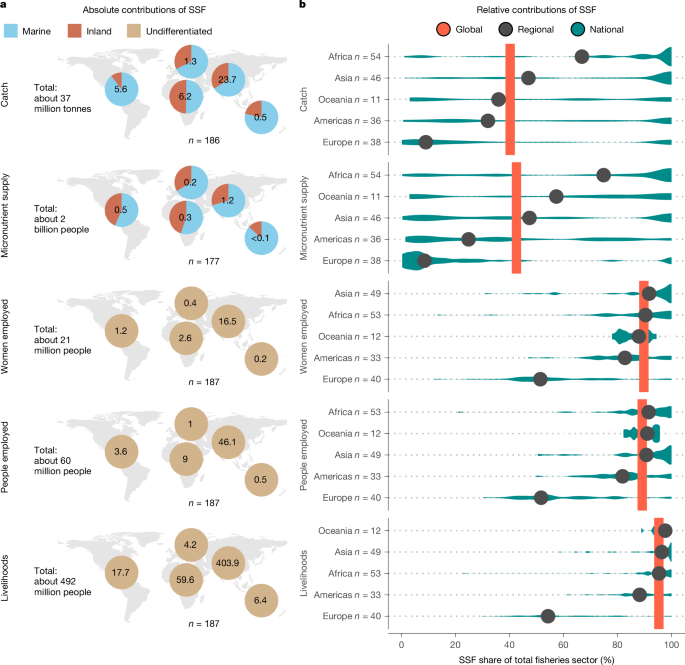Illuminating the multidimensional contributions of small-scale fisheries
IF 50.5
1区 综合性期刊
Q1 MULTIDISCIPLINARY SCIENCES
引用次数: 0
Abstract
Sustainable development aspires to “leave no one behind”1. Even so, limited attention has been paid to small-scale fisheries (SSF) and their importance in eradicating poverty, hunger and malnutrition. Through a collaborative and multidimensional data-driven approach, we have estimated that SSF provide at least 40% (37.3 million tonnes) of global fisheries catches and 2.3 billion people with, on average, 20% of their dietary intake across six key micronutrients essential for human health. Globally, the livelihood of 1 in every 12 people, nearly half of them women, depends at least partly on small-scale fishing, in total generating 44% (US$77.2 billion) of the economic value of all fisheries landed. Regionally, Asian SSF provide fish, support livelihoods and supply nutrition to the largest number of people. Relative to the total capture of the fisheries sector (comprising large-scale and small-scale fisheries), across all regions, African SSF supply the most catch and nutrition, and SSF in Oceania improve the most livelihoods. Maintaining and increasing these multidimensional SSF contributions to sustainable development requires targeted and effective actions, especially increasing the engagement of fisherfolk in shared management and governance. Without management and governance focused on the multidimensional contributions of SSF, the marginalization of millions of fishers and fishworkers will worsen. A study aimed at revealing the role of small-scale fisheries in sustainable development shows they provide at least 40% of the global fishing catch and affect the livelihoods of 1 in 12 people in the world, among other important contributions.


阐明小规模渔业的多方面贡献
即便如此,人们对小型渔业(SSF)及其在消除贫困、饥饿和营养不良方面的重要性的关注仍然有限。通过合作和多维数据驱动方法,我们估计小型渔业至少提供了全球渔业捕捞量的 40%(3730 万吨),平均为 23 亿人提供了人类健康所必需的六种关键微量营养素膳食摄入量的 20%。在全球范围内,每 12 人中就有 1 人(其中近一半为妇女)的生计至少部分依赖于小型渔业,小型渔业创造的经济价值占所有上岸渔业经济价值的 44%(772 亿美元)。从区域来看,亚洲的小型渔业为最多的人提供鱼类、维持生计和提供营养。相对于渔业部门(包括大型和小型渔业)的总捕捞量,在所有区域,非洲的 SSF 提供了最多的渔获量和营养,大洋洲的 SSF 改善了最多的生计。要保持和增加 SSF 对可持续发展的这些多层面贡献,就需要采取有针对性的有效行动,特别是增加渔民对共同管理和治理的参与。如果管理和治理不注重 SSF 的多层面贡献,数百万渔民和渔工的边缘化问题将进一步恶化。
本文章由计算机程序翻译,如有差异,请以英文原文为准。
求助全文
约1分钟内获得全文
求助全文
来源期刊

Nature
综合性期刊-综合性期刊
CiteScore
90.00
自引率
1.20%
发文量
3652
审稿时长
3 months
期刊介绍:
Nature is a prestigious international journal that publishes peer-reviewed research in various scientific and technological fields. The selection of articles is based on criteria such as originality, importance, interdisciplinary relevance, timeliness, accessibility, elegance, and surprising conclusions. In addition to showcasing significant scientific advances, Nature delivers rapid, authoritative, insightful news, and interpretation of current and upcoming trends impacting science, scientists, and the broader public. The journal serves a dual purpose: firstly, to promptly share noteworthy scientific advances and foster discussions among scientists, and secondly, to ensure the swift dissemination of scientific results globally, emphasizing their significance for knowledge, culture, and daily life.
 求助内容:
求助内容: 应助结果提醒方式:
应助结果提醒方式:


